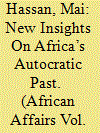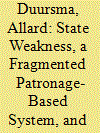|
|
|
Sort Order |
|
|
|
Items / Page
|
|
|
|
|
|
|
| Srl | Item |
| 1 |
ID:
185835


|
|
|
|
|
| Summary/Abstract |
The 1983–1985 famine in Ethiopia is perhaps one of the most internationally recognized instances of acute human suffering. Although the international community’s response to the crisis and the ways in which the famine reshaped the nature of humanitarian aid have been probed, less often discussed is that one of the most effective relief organizations delivering assistance—the Relief Society of Tigray (REST)—was the humanitarian wing of an insurgency, the Tigrayan People’s Liberation Front (TPLF). This article asserts that the process of responding to the famine amidst a protracted civil war left an indelible mark on the ways in which the TPLF approached domestic civil society and international assistance after war as a part of the governing party, the Ethiopian People’s Revolutionary Democratic Front. This article describes the legacies of the rebels’ wartime humanitarian activities. It asserts that REST’s prominence as an organization, its role as a model and catalyst for other party-affiliated organizations, the government’s suspicion of domestic civil society and efforts to strictly control international assistance, and its reliance on service delivery to bolster its domestic legitimacy are all legacies of the rebels’ wartime governance. In doing so, this article calls for greater attention to the dynamics of rebels’ wartime humanitarian activities and the post-conflict implications of this form of rebel governance.
|
|
|
|
|
|
|
|
|
|
|
|
|
|
|
|
| 2 |
ID:
185839


|
|
|
|
|
| Summary/Abstract |
THE EIGHTH FORUM ON CHINA-AFRICA COOPERATION (FOCAC) was held in Dakar on 29–30 November 2021. It saw the Chinese government, 53 African countries and the African Union (AU) Commission meet under the theme ‘Deepen China-Africa Partnership and Promote Sustainable Development to Build a China-Africa Community with a Shared Future in the New Era’. Staged every 3 years, FOCAC is usually an important and high-profile event to take stock of developments in China–Africa relations, but interest in the 2021 Dakar FOCAC was more muted than previously. This reflected its ministerial—rather than heads of state summit—level and the challenges of convening such a meeting during the coronavirus disease 2019 (Covid-19) pandemic. It also reflected the comparatively less eye-catching nature of its results, with other media stories, such as the possible Chinese seizure of Entebbe Airport in Uganda, upstaging proceedings.1 Many external reactions to FOCAC’s outcomes could be summarized as less money and more caution from Beijing.
|
|
|
|
|
|
|
|
|
|
|
|
|
|
|
|
| 3 |
ID:
185836


|
|
|
|
|
| Summary/Abstract |
A growing debate concerns the developmental implications of booming relations between ‘Southern’ powers and countries across Africa. Whilst mainstream commentary worries about nefarious influences, others explore supposedly increasing ‘African agency’, a term capturing the ability of African states to define their international relations. South-South Cooperation, given its supposed principles asserting sovereignty, non-interventionism, and demand-led projects, is understood to boost such agency. This article analyses such claims with a detailed case study of Indian governmental infrastructure financing in Africa, the Nyabarongo Dam in Rwanda, filling a significant gap concerning under-researched India–Africa relations. Originally, South-South cooperation was rooted in a programme that combined technical cooperation with a radical political critique of global power and a call for reform. However, this study of India’s concessional finance suggests that in its twenty-first century manifestation, South-South Cooperation is often decoupled from a political programme, leaving only open-ended, depoliticized state-to-state cooperation initiatives. The article demonstrates that whilst India’s development cooperation generated useful opportunities, it acted to empower companies and exacerbated the Rwandan state’s structural regulatory weaknesses. The article traces this to the policymaking practices of India’s development cooperation, showing that a decoupling of political ambitions results in a narrow state-to-state focus with an abdication of responsibility for development outcomes, marginalizing accountability to average African citizens.
|
|
|
|
|
|
|
|
|
|
|
|
|
|
|
|
| 4 |
ID:
185834


|
|
|
|
|
| Summary/Abstract |
Social media misinformation is widely recognized as a significant and growing global problem. Yet, little is known about how misinformation spreads across broader media ecosystems, particularly in areas with varying internet access and connectivity. Drawing on research in northern Ghana, we seek to address this gap. We argue that ‘pavement media’—the everyday communication of current affairs through discussions in marketplaces, places of worship, bars, and the like and through a range of non-conversational and visual practices such as songs, sermons, and graffiti—is a key link in a broader media ecosystem. Vibrant pavement and traditional media allow for information from social media to quickly cross into offline spaces, creating a distinction not of the connected and disconnected but of first-hand and indirect social media users. This paper sets out how social, traditional, and pavement media form a complex and deeply gendered and socio-economically stratified media ecosystem and investigates its implications for how citizens differentially encounter, process, and respond to misinformation. Based on the findings, we argue that efforts intended to combat the spread of misinformation need to move beyond the Western-centred conception of what constitutes media and take different local modalities of media access and fact-checking into account.
|
|
|
|
|
|
|
|
|
|
|
|
|
|
|
|
| 5 |
ID:
185841


|
|
|
|
|
| Summary/Abstract |
AFRICA HAS NOT BEEN IMMUNE to recent global trends in democratic backsliding. Although the vast majority of countries on the continent have been holding competitive multi-party elections since the end of the Cold War, we are currently witnessing attempts by elected presidents and ruling parties to extend their tenures through undemocratic means.1 These trends are concerning, not only for those seeing their rights and freedoms constrict, but because they are happening despite the presence of formal democratic institutions that are meant to curb the impulses of autocratic rule.
|
|
|
|
|
|
|
|
|
|
|
|
|
|
|
|
| 6 |
ID:
185838


|
|
|
|
|
| Summary/Abstract |
Candidate selection procedures play a crucial role in shaping parliaments and influencing the quality of democracy. Yet, our understanding of what motivates parties to reform candidate selection mechanisms at specific points in time is limited. To address this gap, we examine the experience of Ghana’s National Democratic Congress (NDC), which reformed its selection procedures in 2015 allowing all party members to vote in primary elections for parliamentary candidates. We ask what triggered these reforms and identify four motivations—the confluence of which explains why the reforms were adopted in 2015. These motivations were: making the party more democratic by expanding participation, reducing the cost of the primary process, building the party’s organizational capacity, and keeping up with the party’s main competitor. Together, these led NDC leaders to believe that reforms would benefit the party. However, a divergence between actual and intended effects meant some of these benefits were not realized, so the NDC reversed its reforms. This case suggests that the current shift towards more inclusive candidate selection mechanisms across parts of Africa will not be linear: party leaders will adopt such reforms when they believe it is in their party’s interest.
|
|
|
|
|
|
|
|
|
|
|
|
|
|
|
|
| 7 |
ID:
185837


|
|
|
|
|
| Summary/Abstract |
There is an academic consensus that addressing the local cleavages that drive armed conflict through local peacemaking is crucial to building peace. However, several studies also suggest that local peacemaking is often unsustainable without the conclusion of a national-level elite pact. This article moves this debate forward by arguing that even if an elite-level pact is in place, a lack of connections between national-level elites and local conflict parties can prevent peace from trickling down from the national level to the local level. This argument is demonstrated by looking at national-level and local peacemaking efforts in the Central African Republic. Although several national-level peace agreements have been concluded in the Central African Republic, extreme state weakness and a highly fragmented patronage-based system have prevented national-level peacemaking efforts from having a positive impact on local peacemaking efforts in the Central African Republic. This article contributes to the literature on conflict resolution in Africa. Many studies have focused on the local peace process, yet the national-level context in which these local peace processes take place is only rarely considered.
|
|
|
|
|
|
|
|
|
|
|
|
|
|
|
|
|
|
|
|
|